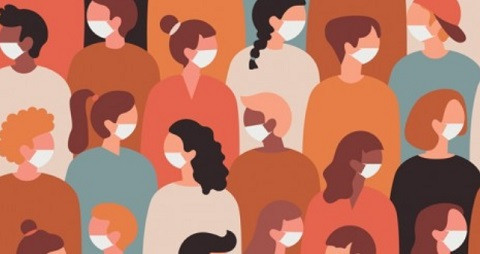
GCED Basic Search Form
Quick Search
أنت هنا
الأخبار

Young people may have been especially susceptible to online hate speech, antisemitism and other forms of prejudice during the pandemic but also held the key to shaping a better post-COVID-19 world, a UNESCO webinar heard.
The webinar, jointly organized by UNESCO's Education and Social and Human Sciences sectors on 23 June 2020, was held on the theme of antisemitism which has seen a rise during the COVID-19 pandemic. It is the twelfth in the international webinar series “Inclusion in the time of COVID-19”, which focuses on addressing racism, discrimination and exclusion during the pandemic.
Speakers included Ahmed Shaheed, UN Special Rapporteur on Freedom of Religion or Belief (Maldives), Günther Jikeli, Erna B. Rosenfeld Professor, Institute for the Study of Contemporary Antisemitism, Indiana University, Bloomington (USA), Vanessa Hites, Jewish Diplomatic Corps of the World Jewish Congress (Chile), and Pamela Malewicz, Undersecretary for Human Rights and Cultural Pluralism, City of Buenos Aires (Argentina).
The ongoing global pandemic has spurred a fast-spreading epidemic of hate speech and disinformation including conspiracy theories with a clear antisemitic motive. Data from the World Jewish Congress shows that in the first months of the pandemic, there was a 30% increase in antisemitic content on social media, a figure which reflects a general trend of growing antisemitism worldwide and related hate crimes worldwide.
Günther Jikeli said the uptick in antisemitism was not a coincidence. "Antisemitism is often a dormant feeling or way of thinking. Situations of crisis and uncertainty, like the current one, are especially prone to trigger antisemitism, blaming Jews for what is happening,” he said.
He said recent violent extremist attacks with an antisemitic motive in Toulouse, Pittsburgh and Halle revealed the close link between online hate speech and offline violence. “This may include praise and positive reflections among extremist circles, which may lead to more violent attacks against Jews,” he said.
Rise in conspiracy theories
Ahmed Shaheed, who in 2019 published the first ever UN report on antisemitism, Combatting Antisemitism to Eliminate Discrimination and Intolerance Based on Religion or Belief, said, in addition to the rise of antisemitism, the pandemic had seen a rise in both scapegoating and the spreading of conspiracy theories. Inequalities and rates of infection and death had been exacerbated among several minority communities.
“There have been numerous reports of violence and discrimination (…) and other forms of disparate impact on minorities, including on people of Asian descent, refugees, asylum seekers, migrants, and religious minorities as well as other groups exposed to stigma and discrimination, such as LGBTQ people. This includes an increased proliferation of conspiracy theories and scapegoating, connecting the COVID-19 pandemic with antisemitic, anti-Muslim, anti-Christian, anti-Roma hatred and so on.”
Conspiracy theories lie at the heart of antisemitism, defined by the International Holocaust Remembrance Alliance (IHRA) as “a certain perception of Jews, which may be expressed as hatred towards Jews.” Contemporary forms of antisemitism such as Holocaust denial and distortion and Israel-related antisemitism, when tensions in the Middle East are used as a pretext to attack Jews collectively, falsely suggest that “Jews” seek power, control or personal profit through an alleged secret plot.
Lawyer and human rights activist Vanessa Hites underlined the need for clear responses to antisemitism and other forms of hate speech online and offline. “I don’t think the pandemic has created a new form of antisemitism, but has rather revived existing prejudice and old stereotypes”, she said.
She said the pandemic had led to more people spending more time online with greater exposure to hateful discourses. The anonymity of the internet emboldened some while the lack of media and information literacy made young people especially susceptible to disinformation and conspiracy theories.
“It is important that young people know their rights online and learn to be responsible for their online behaviour and related actions,” she said.
Addressing past and present forms of antisemitism
Pamela Malewicz said her city of Buenos Aires had taken a holistic approach, working closely with cultural institutions and museums, such as the Anne Frank House and Holocaust Museum in Buenos Aires, civil society, Jewish communities as well as youth groups to address past and present forms of antisemitism.
She emphasized that the shared experience of the pandemic was an opportunity to build empathy and understanding beyond social groups and between persons of different beliefs and identities.
Opportunities for change were also highlighted by Vanessa Hites: “Young people have a real opportunity to shape the post-COVID world. Not in a cowardly way, hidden behind screens or disguised by large crowds, but by taking an active role, speaking up and engaging in dialogue with more senior decision-makers.”
Ahmed Shaheed reminded the webinar that the recommendations of the 2019 report included strengthening legal protection of Jewish communities, close monitoring of hate speech and hate crimes, victim support, as well as strengthening efforts to address antisemitism in and through education.
UNESCO promotes activities to address and prevent contemporary antisemitism within the framework of its programmes on the prevention of violent extremism and Global citizenship education (GCED) which seek to build the resilience of young people to extremist ideologies and prejudice. In the context, UNESCO has published policy guidelines on “Addressing anti-Semitism through education” with the OSCE Office for Democratic Institutions and Human Rights (ODIHR) in 2018 and consequently trained policy-makers from over 60 countries worldwide. For more information, please visit UNESCO’s dedicated website.
URL:
https://en.unesco.org/news/youth-engagement-key-counter-rise-antisemitism-spurred-covid-19
